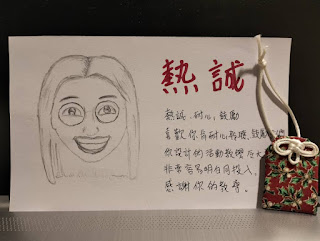Tomorrow, I'm teaching functions (asking for and giving directions) and just today I had an input session on Teaching Functional Language. Well, of course I needed to adjust my lesson plan that I had prepared previously after this session.
It's interesting how we started the session by having a look at two different conversations and finding out which utterance that seemed out of context and why. It reminded me of Discourse Analysis when I was doing my Master. I've always found it amazing to analyze how particular words, expressions, or sentences are used in a particular context by someone. Well, definitely we need to think about when, where, and of course who the person is actually talking to. And, it's all about the functional language teaching which basically consists of two elements, function and exponent. Function means what we are doing with the language, and exponent refers to what is said. For example, in my TP tomorrow, the function is 'asking for and giving directions', and the language used to do this is called functional exponent. It means that formality and register are necessary, for example from most direct to most polite ways to ask for or give directions. Other than than, teaching form is as important with the focus of what the expression is as a whole and what comes next in the expression.
The next session talked about Teacher Talk Time (TTT) by Erin. Honestly, this is my challenge. I find it not easy to control my TTT. I've been trying my best so far though. It's really helpful to start the session by thinking about when or the reason why a teacher talks in class. Some examples are such as giving instruction, for sure, or having a chit chat to build a rapport with students. During the session I kept reflecting on my teaching, especially in grading language. It's my first time to discuss this specific topic and have a look at a few examples of TTT, then think about the impact on the learner. Looking at TTT from learners' perspective. That's it. That's really new to be, but insightful. In the middle of the session, we had a chain dictation. It was really fun, and guess what? I thought about using it in my next lesson. Let's see how it's going tomorrow. Anyways, about TTT, it can be reduced by doing it in more student-centered way. For example, instead of me telling students the meaning of the vocabulary, I can have them do a matching activity. Unfortunately, we ran out of time and couldn't explore up to monitoring and stopping activities in a classroom.
After lunch, I observed Carys, Ethan, and George. After sharing the feedback, Erin shared some ideas about the stages in teaching Functions and Writing because tomorrow Ethan and I are doing the lessons.
Teaching Writing
- Lead-in
- Model text (read for context)
- Look at the features (language, organization, genre features)
- Planning time
- Writing task
- Peer feedback
- Lead-in
- Contextualization
- Meaning, Form, Pronunciation, Appropriacy (MFPA)
- Controlled practice
- Free practice (more)
- Error correction/feedback








